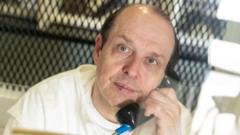A Texas judge has granted a temporary stay of execution for Robert Roberson, marking a dramatic twist in a case that has sparked widespread debate over the controversial diagnosis of "shaken baby syndrome." Roberson, who was sentenced to death in 2003 for the death of his two-year-old daughter, Nikki Curtis, was set to be executed on Thursday but received the reprieve less than two hours before the scheduled execution time.
Roberson, 57, has maintained his innocence, claiming that Nikki's death was due to complications from pneumonia rather than abuse. Despite the belief of many, including medical experts and a bipartisan group of lawmakers, that his conviction hinges on outdated science, Texas prosecutors insist they have not seen sufficient new evidence to overturn the initial ruling.
The temporary restraining order was issued by a Travis County judge following a subpoena from a Texas House panel, which requested Roberson’s testimony at an upcoming legislative hearing. This move highlights the intense scrutiny and ongoing discussions surrounding the case, which has drawn support from high-profile individuals, including author John Grisham.
Following a denial of clemency from the Texas Board of Pardons and Paroles and a lack of intervention from the U.S. Supreme Court, Roberson's execution seemed imminent until the eleventh-hour decision by the Travis County judge, aiming to ensure that new evidence could be fully examined.
Roberson's legal team has emphasized that the lack of emotional display he exhibited during the investigation may have played a role in his wrongful conviction, given that he was undiagnosed with autism at the time. Detective Brian Wharton, who investigated Nikki’s death, voiced his regret, stating, "I'll forever be haunted by the role I played in helping the state put this innocent man on death row."
While various experts and advocates have pointed out that alternative explanations for Nikki's injuries have not been sufficiently considered, the state continues to defend its original position. As Roberson's case unfolds, the implications for the use of "shaken baby syndrome" as a basis for criminal convictions hang in the balance, drawing attention to the complexities of justice in cases of suspected child harm.























